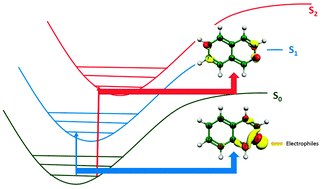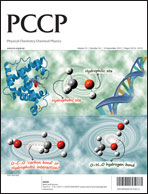A proposal for an extended dual descriptor: a possible solution when Frontier Molecular Orbital Theory fails
Abstract
In this paper, we introduce new local descriptors in the framework of Conceptual Density Functional Theory. They can be considered as an extension of the dual descriptor [Morell et al., J. Phys. Chem. A, 2005, 109, 205]. These indices are particularly suited for the discrimination between electrophilic and nucleophilic sites inside a molecule. They are computed using the densities of the electronic excited states, giving a picture of the polarization of the electron density induced by the approach of a reactant. Links with the linear-response function are discussed, and the first examples of applications are given, highlighting how these new descriptors can be used in practice for reactivity studies. It has been found that this extension of the dual descriptor can handle tricky cases, such as


 Please wait while we load your content...
Please wait while we load your content...